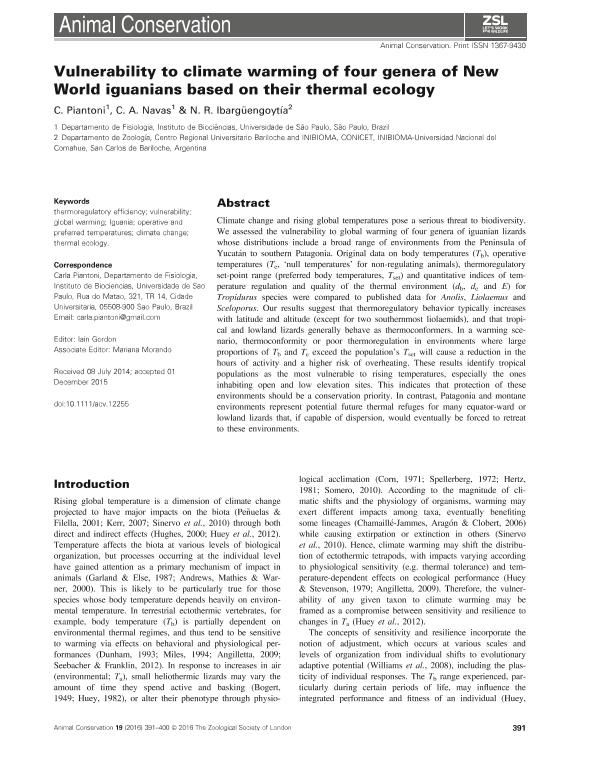Mostrar el registro sencillo del ítem
dc.contributor.author
Piantoni, Carla

dc.contributor.author
Navas, Carlos Arturo

dc.contributor.author
Ibarguengoytía, Nora

dc.date.available
2023-01-06T11:54:38Z
dc.date.issued
2016-08
dc.identifier.citation
Piantoni, Carla; Navas, Carlos Arturo; Ibarguengoytía, Nora; Vulnerability to climate warming of four genera of New World iguanians based on their thermal ecology; Wiley Blackwell Publishing, Inc; Animal Conservation; 19; 4; 8-2016; 391-400
dc.identifier.issn
1367-9430
dc.identifier.uri
http://hdl.handle.net/11336/183681
dc.description.abstract
Climate change and rising global temperatures pose a serious threat to biodiversity. We assessed the vulnerability to global warming of four genera of iguanian lizards whose distributions include a broad range of environments from the Peninsula of Yucatán to southern Patagonia. Original data on body temperatures (Tb), operative temperatures (Te, ‘null temperatures’ for non-regulating animals), thermoregulatory set-point range (preferred body temperatures, Tset) and quantitative indices of temperature regulation and quality of the thermal environment (db, de and E) for Tropidurus species were compared to published data for Anolis, Liolaemus and Sceloporus. Our results suggest that thermoregulatory behavior typically increases with latitude and altitude (except for two southernmost liolaemids), and that tropical and lowland lizards generally behave as thermoconformers. In a warming scenario, thermoconformity or poor thermoregulation in environments where large proportions of Tb and Te exceed the population's Tset will cause a reduction in the hours of activity and a higher risk of overheating. These results identify tropical populations as the most vulnerable to rising temperatures, especially the ones inhabiting open and low elevation sites. This indicates that protection of these environments should be a conservation priority. In contrast, Patagonia and montane environments represent potential future thermal refuges for many equator-ward or lowland lizards that, if capable of dispersion, would eventually be forced to retreat to these environments.
dc.format
application/pdf
dc.language.iso
eng
dc.publisher
Wiley Blackwell Publishing, Inc

dc.rights
info:eu-repo/semantics/openAccess
dc.rights.uri
https://creativecommons.org/licenses/by-nc-sa/2.5/ar/
dc.subject
CLIMATE CHANGE
dc.subject
GLOBAL WARMING
dc.subject
IGUANIA
dc.subject
OPERATIVE AND PREFERRED TEMPERATURES
dc.subject
THERMAL ECOLOGY
dc.subject
THERMOREGULATORY EFFICIENCY
dc.subject
VULNERABILITY
dc.subject.classification
Ecología

dc.subject.classification
Ciencias Biológicas

dc.subject.classification
CIENCIAS NATURALES Y EXACTAS

dc.title
Vulnerability to climate warming of four genera of New World iguanians based on their thermal ecology
dc.type
info:eu-repo/semantics/article
dc.type
info:ar-repo/semantics/artículo
dc.type
info:eu-repo/semantics/publishedVersion
dc.date.updated
2023-01-06T09:30:55Z
dc.journal.volume
19
dc.journal.number
4
dc.journal.pagination
391-400
dc.journal.pais
Reino Unido

dc.journal.ciudad
Londres
dc.description.fil
Fil: Piantoni, Carla. Universidade de Sao Paulo. Departamento de Fisiología. Instituto de Biociencias; Brasil
dc.description.fil
Fil: Navas, Carlos Arturo. Universidade de Sao Paulo. Departamento de Fisiología. Instituto de Biociencias; Brasil
dc.description.fil
Fil: Ibarguengoytía, Nora. Consejo Nacional de Investigaciones Científicas y Técnicas. Centro Científico Tecnológico Conicet - Patagonia Norte. Instituto de Investigaciones en Biodiversidad y Medioambiente. Universidad Nacional del Comahue. Centro Regional Universidad Bariloche. Instituto de Investigaciones en Biodiversidad y Medioambiente; Argentina
dc.journal.title
Animal Conservation

dc.relation.alternativeid
info:eu-repo/semantics/altIdentifier/url/http://doi.wiley.com/10.1111/acv.12255
dc.relation.alternativeid
info:eu-repo/semantics/altIdentifier/doi/http://dx.doi.org/10.1111/acv.12255
Archivos asociados
